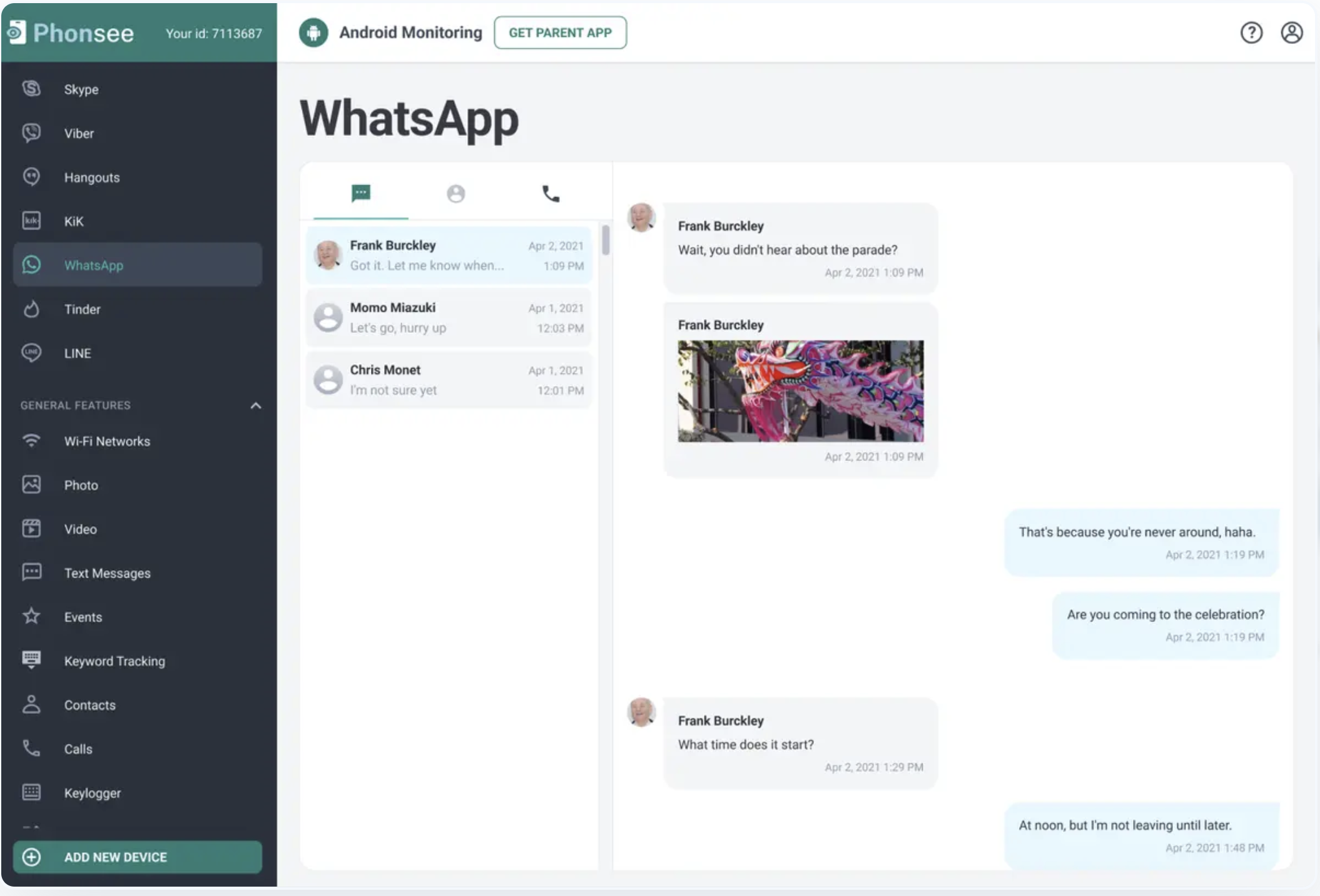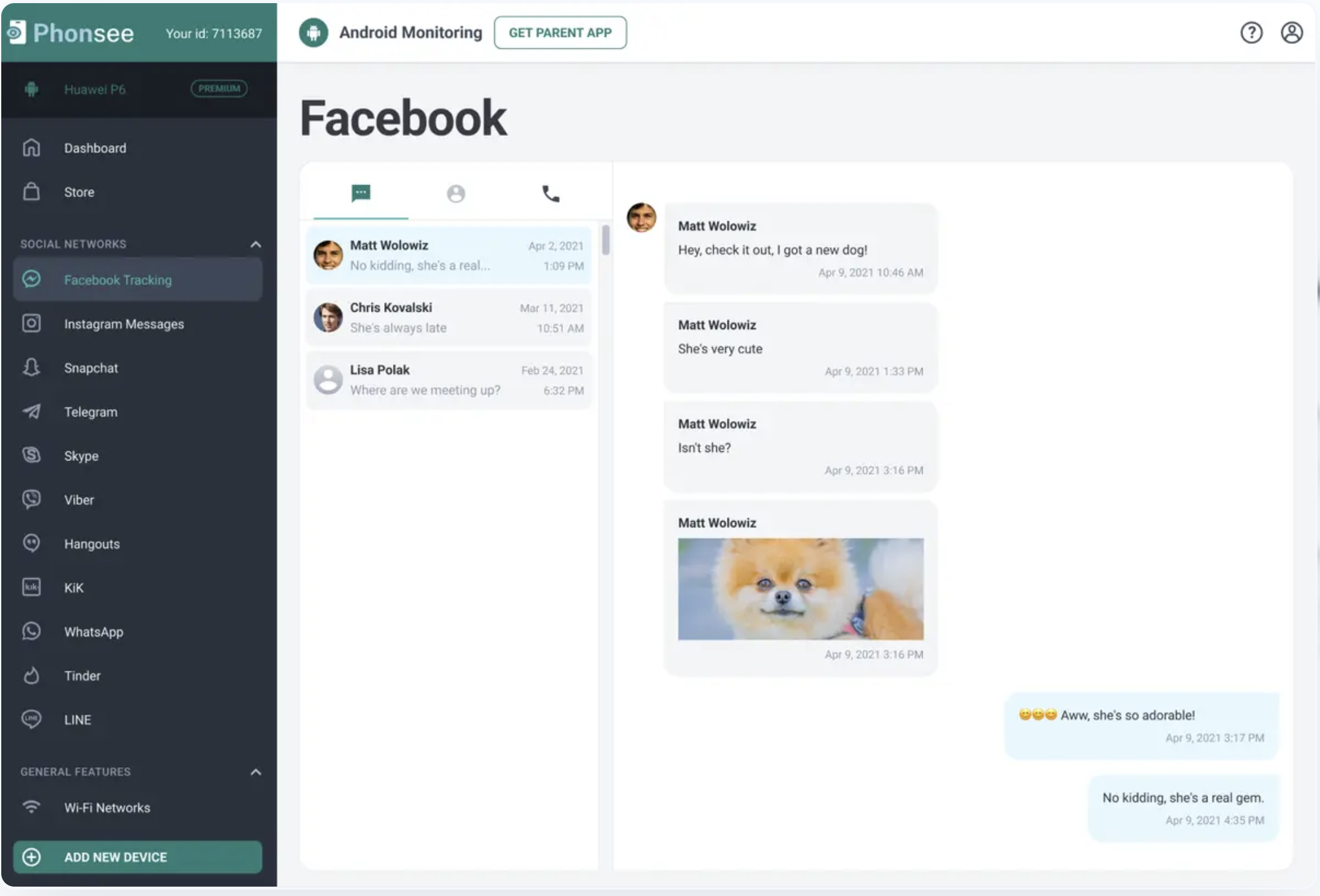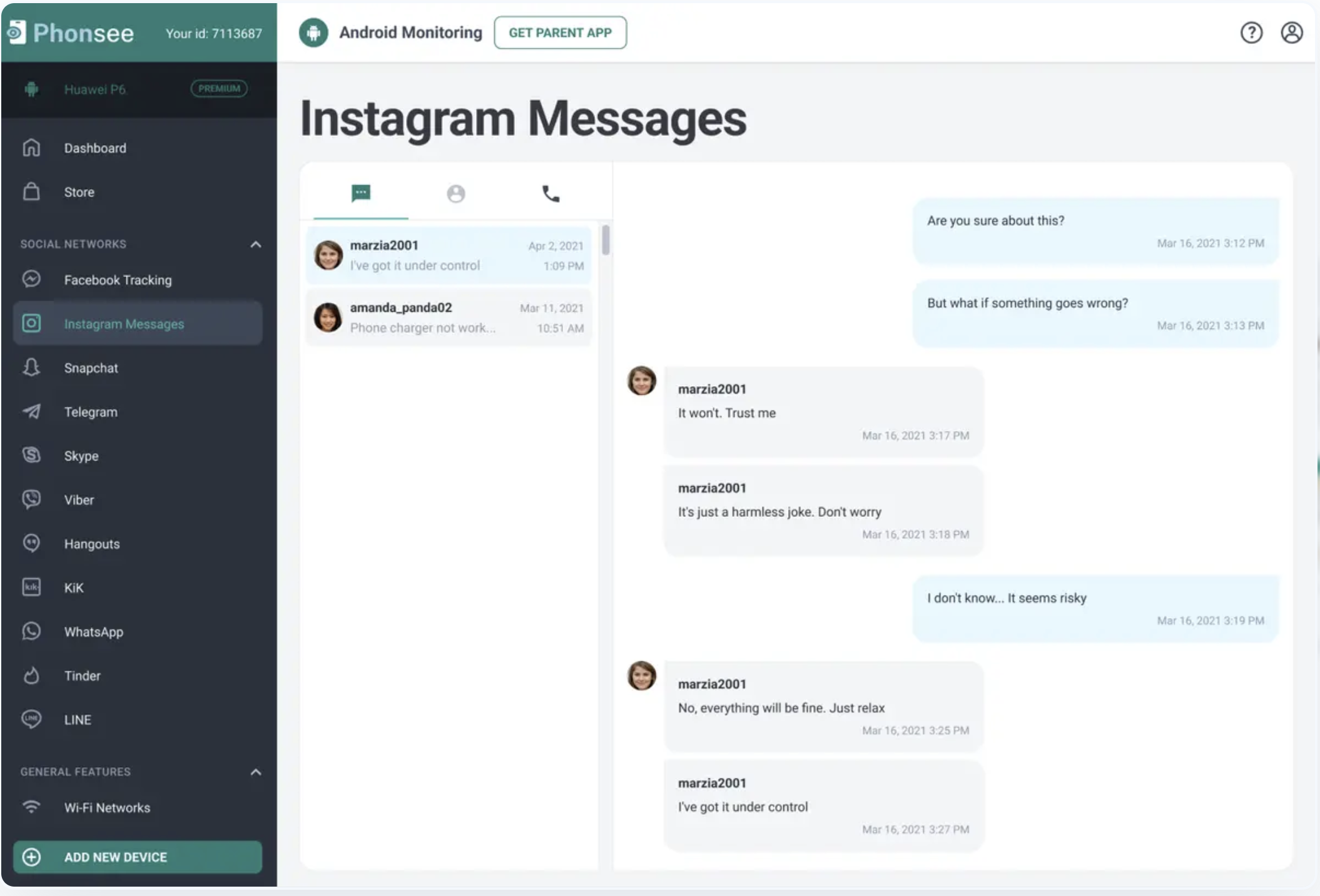- See texts, calls, GPS, social media, and much more!
- Compare the best phone spy apps for Android and iPhone
- Money-saving information. We did the leg work, so you don’t have to.
These reviews have been updated on Jan 30, 2025 to include the latest updates and functions
#1 – Pro Spy
TOP PICK: The best spy system without having the phone. Apply to all phones and tablets. No possession is needed.
Pro Spy – Advanced Phone Monitoring Solution
 Pro Spy provides a comprehensive mobile monitoring solution designed for parental supervision, employee monitoring (with consent), and personal device management. It offers seamless access to important phone usage data, ensuring peace of mind for those responsible for overseeing digital activity. Compatible with all Android and iPhone devices, Pro Spy is user-friendly, making it accessible even for those without technical expertise.
Pro Spy provides a comprehensive mobile monitoring solution designed for parental supervision, employee monitoring (with consent), and personal device management. It offers seamless access to important phone usage data, ensuring peace of mind for those responsible for overseeing digital activity. Compatible with all Android and iPhone devices, Pro Spy is user-friendly, making it accessible even for those without technical expertise.
Advanced Mobile Monitoring Made Simple
Pro Spy offers a streamlined mobile monitoring application that allows you to securely track and review phone activity. With an easy-to-use interface and remote access capabilities, it’s designed to help users responsibly oversee digital communications and location details.
How It Works
Pro Spy applications establish a secure online connection with the device you wish to monitor, allowing you to view key activity insights.
Three Easy Steps:
- Install – Use the provided link to install the application on the device.
- Activate – Enter the unique license key provided with your purchase.
- Monitor – Access activity reports from your secure online dashboard on any phone, tablet, or computer.
Features
- Remote Access – View available phone activity securely from your device.
- Text Message Monitoring – See sent and received text messages, including iMessages, even if deleted.
- Call Logs – Review incoming and outgoing call details.
- GPS Tracking – Monitor the location of the device within a close range.
- WhatsApp & Social Media Insights – Track messages exchanged on popular apps like WhatsApp, Facebook, Instagram, Snapchat, and TikTok.
- Keylogger – Capture typed entries for a detailed activity log.
- Photos & Videos – Access media stored on the device.
- Web History – View browsing activity, including visited sites.
- Email Monitoring – Review email content, sender, and recipient details.
- Installed Applications – See all apps currently installed on the device.
- Stealth Mode – The application runs discreetly in the background.
Pro Spy ensures a responsible and ethical approach to mobile monitoring, offering transparency and security for personal or professional use.
#2 – mSpy
Works with all Androids and iPhones. An excellent choice!  Keeping kids safe these days can feel like a full-time job, especially with the challenges of managing both their online and offline worlds. That’s where mSpy comes in. It’s one of the top parental control tools on the market, designed to give parents the peace of mind they deserve by offering a full suite of monitoring features. Let’s face it—when it comes to your child’s safety, there’s no room for guesswork. That’s why mSpy is such a popular choice for families.
Keeping kids safe these days can feel like a full-time job, especially with the challenges of managing both their online and offline worlds. That’s where mSpy comes in. It’s one of the top parental control tools on the market, designed to give parents the peace of mind they deserve by offering a full suite of monitoring features. Let’s face it—when it comes to your child’s safety, there’s no room for guesswork. That’s why mSpy is such a popular choice for families.
But how does it actually work?
- mSpy is a discreet app to monitor phone activities. Once installed on the child’s/partner device, it runs in the background without drawing any attention. Kids won’t even know it’s there!
- The app is password-protected, so even if your child does discover it, they won’t be able to access or change any settings.
- It’s designed to be lightweight, using minimal battery power and having virtually no impact on device performance.
- Another bonus? It’s super user-friendly. Even if you’re not tech-savvy, setting up and using mSpy is straightforward and hassle-free.
Pros
- Comprehensive device monitoring including texts, calls, and social media.
- Real-time GPS location tracking.
- User-friendly interface that’s easy to navigate.
Cons
- Requires jailbreaking for iOS devices for full functionality.
- Relatively high cost compared to other apps.
mSpy Key Features
mSpy offers a comprehensive set of features designed to help parents effectively track and monitor their children’s digital activities. Below is a concise overview of its capabilities:
- GPS Location Tracking – Keep track of your child’s whereabouts in real-time.
- Contact Monitoring – View details of saved contacts on the device.
- Call Recording – Record both incoming and outgoing phone calls.
- Text Message Tracking – Monitor and log all sent and received SMS messages.
- Keyword Alerts – Receive notifications when your child types specific words, including inappropriate or mature content.
- Device Status Monitoring – Check storage availability, battery life, and other system details.
- Multimedia and App Supervision – Access saved photos, videos, browsing history, and installed applications.
- Remote Call Log Management – Delete call records remotely to prevent your child from seeing certain missed calls.
- Remote Data Wipe – Erase all data or perform a factory reset if the device is lost or stolen.
- Log Exporting – Save monitoring data in multiple formats, such as PDF, CSV, or Excel.
- Remote Lock and Restart – Secure the device by locking or rebooting it remotely.
These features make mSpy a powerful tool for ensuring your child’s safety and managing their digital interactions responsibly.
The Highlights of Using mSpy:
- Comprehensive Social Media and Messaging Monitoring mSpy keeps an eye on almost every major social media and messaging app. It records everything your child sees and says, allowing you to review conversations and content later. This makes it easy to spot anything inappropriate or concerning.
- Built-In Keylogger One standout feature is the built-in keylogger. With this tool, you can see every key your child presses, giving you insights into their messages and even their passwords. This means you can log into their social media accounts if needed to ensure everything is safe and appropriate.
- User-Friendly mSpy Dashboard All the data mSpy collects is displayed on an easy-to-use, cloud-based dashboard. This dashboard lets you track your child’s activity from anywhere, anytime. Whether you’re using a PC, tablet, or smartphone, you just need an internet connection to stay informed.
#3 – Phonsee
Works great on all phones and tablets. No possession is needed.

Overview
Phonsee is a mobile app built for personal safety and emergencies. It offers features such as real-time location tracking, emergency alerts, and quick access to emergency contacts. The app aims to provide users with peace of mind by ensuring they can quickly reach out for help when needed.
Key Features:
Real-Time Location Tracking
Phonsee allows users to track a device’s location in real-time, ensuring that you always know where your family members or lost phone is. 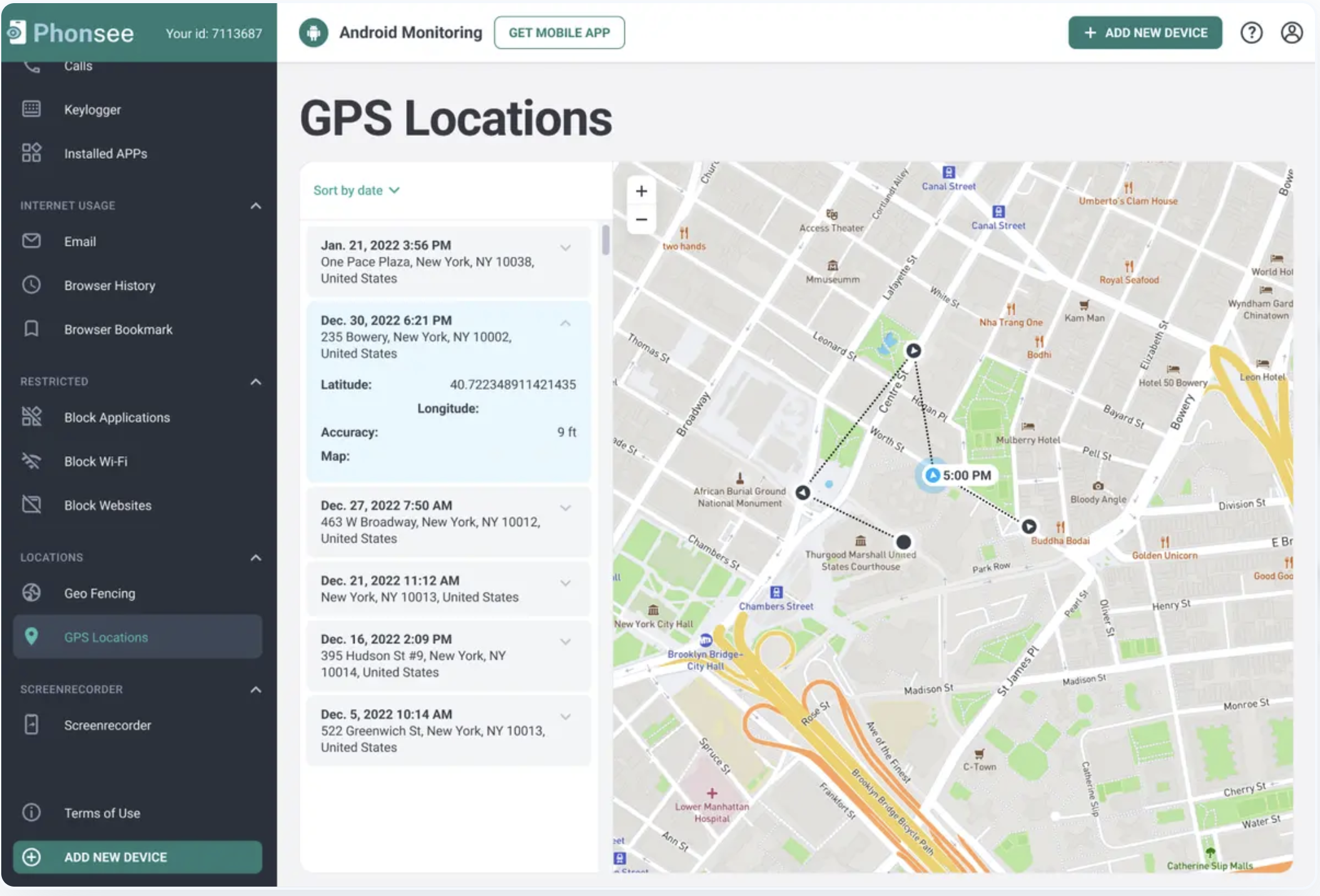
Location History: The app logs the location history of the tracked device, providing insights into past movements and frequently visited places.
Geofencing: With geofencing, users can set up virtual boundaries and receive alerts when the tracked device enters or leaves the designated area.
Stealth Mode: The app operates in the background without notifying the user of the tracked device, ensuring discreet monitoring.
Cross-Platform Compatibility: Phonsee supports both Android and iOS devices, making it a versatile solution for all users.
Emergency Alerts: Users can set up emergency contacts who will receive location-based alerts in case of emergencies.
Call and Text Monitoring: With Phonsee, users can monitor all incoming and outgoing calls, view call logs, check timestamps, and access contact details. The app also tracks SMS messages, even if they have been deleted, allowing you to stay informed about conversations happening on the target phone.
Messenger and Social Media Tracking: Phonsee provides comprehensive monitoring of multiple messaging and social media platforms. Users can track conversations, view shared media, and check timestamps.
WhatsApp Monitoring: Phonsee allows you to track all WhatsApp messages, including sent, received, and deleted texts. Users can also monitor voice notes, call logs, and shared media files.
Facebook Messenger Tracking: Users can monitor Facebook Messenger conversations, including private messages and group chats. The app captures text messages, images, and shared links.
Snapchat Tracking: Since Snapchat messages disappear after being viewed, Phonsee takes screenshots of conversations and stores them for review. This ensures you never miss any crucial details.
Instagram Tracking: Phonsee enables monitoring of Instagram direct messages, allowing users to view conversations and shared media files. It also tracks followers and interactions.
Telegram Monitoring: Telegram messages, including secret chats, are accessible through Phonsee. Users can monitor text messages, media files, and call logs.
Viber Tracking: Phonsee provides detailed tracking of Viber messages, including private and group conversations, call logs, and shared media.
Kik Tracking: Users can monitor Kik messages, view chat history, and check for any exchanged media files.
Browser History Tracking: Phonsee records all visited websites and bookmarks, allowing you to monitor internet activity. This feature helps protect kids from inappropriate content and ensures employees are not misusing work devices.
Media File Access: Users can view all photos and videos stored on the target device. This includes media shared via social media and downloaded files.
Wi-Fi Network Tracking: Phonsee logs all Wi-Fi networks the target device has connected to. This feature helps track internet usage locations and detect unauthorized access.
Battery Efficient: Phonsee is designed to track locations without significantly draining the phone’s battery.
#4 – FlexSpy
Features provided
- Monitor messages and social media activity.
- Check call logs, locations, and calendar events.
- Record calls and its surrounding.
- Keep track of each keystroke on Android phone.
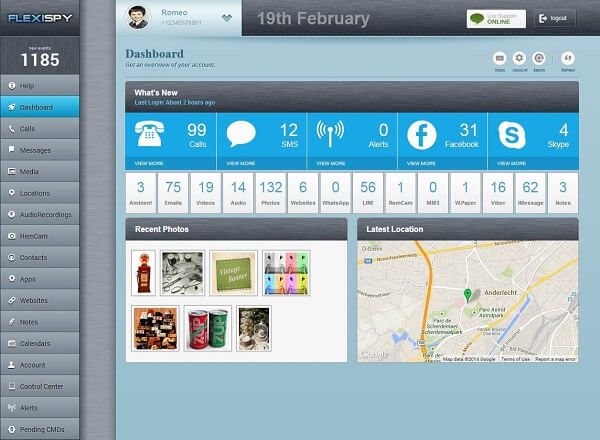
#5 – KidsGuard Pro
 KidsGuard Pro is the best spy app for Android that is used by countless people around the world every day. It is capable of recording everything happening on the target Android phone and then sharing the information to an online panel, which means you can access it from anywhere. The app guarantees a quick installation process and runs in the background in stealth mode. Besides, the app icon can be hidden from the home screen. This helps you spy on the target Android without being found. It offers groundbreaking features for an unbeatable price. You can stay informed of where, what and who your target interacts with on their smartphones. Take a closer look at its features below and a free demo is offered by the app.
KidsGuard Pro is the best spy app for Android that is used by countless people around the world every day. It is capable of recording everything happening on the target Android phone and then sharing the information to an online panel, which means you can access it from anywhere. The app guarantees a quick installation process and runs in the background in stealth mode. Besides, the app icon can be hidden from the home screen. This helps you spy on the target Android without being found. It offers groundbreaking features for an unbeatable price. You can stay informed of where, what and who your target interacts with on their smartphones. Take a closer look at its features below and a free demo is offered by the app.
- Call recordings & call logs: Records all calls on the target Android along with contact information, call duration, time, and date.
- Messages: Read each sent, received, even deleted text message on the target device.
- Social media: Spy on all the popular social media apps – like Facebook, Snapchat, WhatsApp, LINE, Instagram and more. You can see private chats, contacts, and exchanged media files.
- Location: Track locations in real-time and hold a list of location history. You can get street addresses, geographical coordinates, timestamps, and other location-related information. You can set up a Geofence too.
- Browser history: Record each site visited even in incognito mode. You can view the site URL, visit frequency, and last visit time.
- Remote control: Take a live screenshot of the target device and take photos with the target’s rear camera.
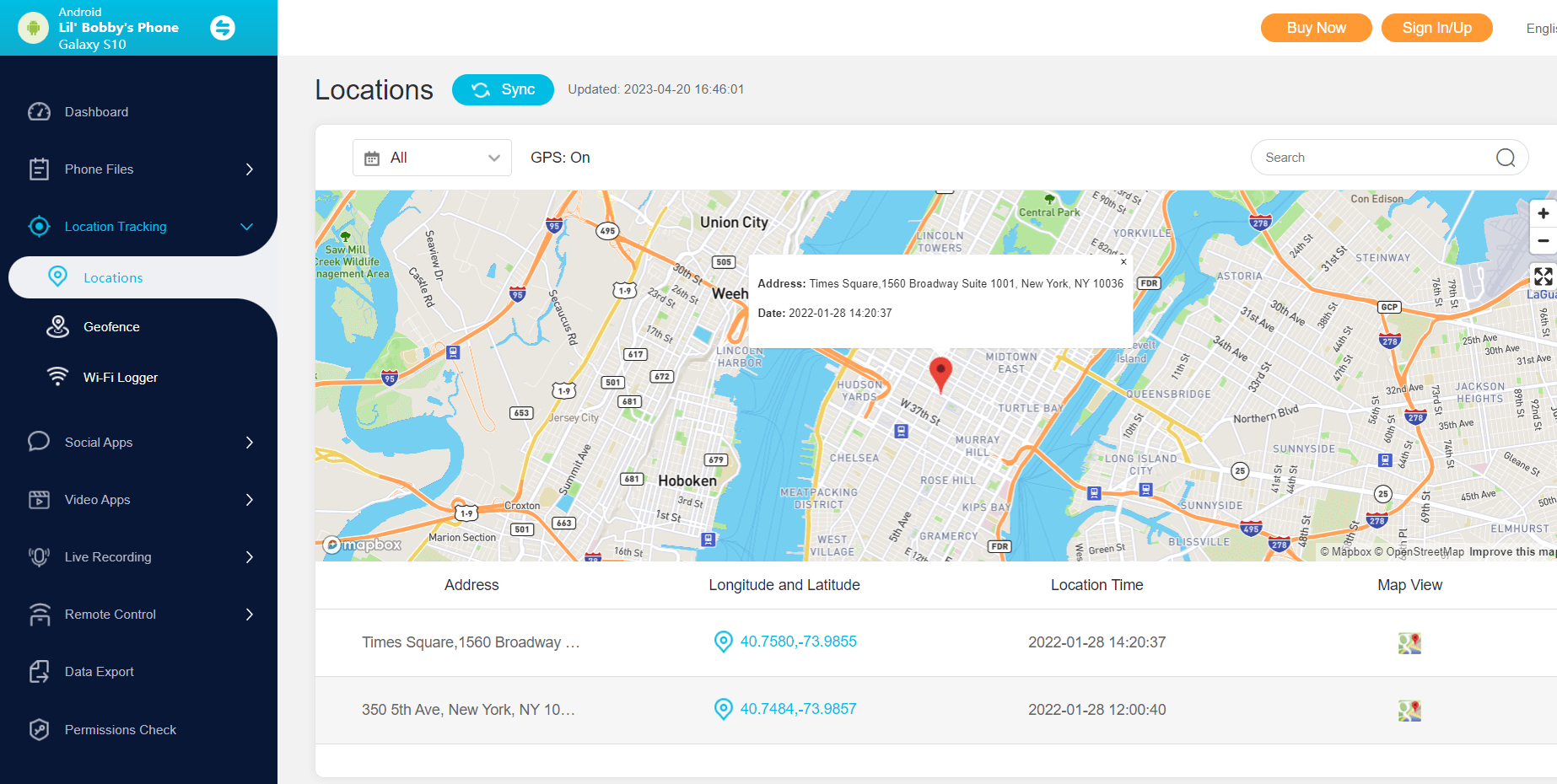
It is illegal in most countries to install monitoring/surveillance software onto a cell phone or any electronic device for which you do not have proper authorization.
With this type of monitoring software, you’ll need an easy-to-use program that features full telephone support. Skip any company that doesn’t include a toll-free phone support for its phone monitoring apps. If you’re note able to use the program you paid for, you’ll become as frustrated as I did without free phone support
Another thing that’s important to know before using a phone monitoring app is that unlike typical apps from Google Play or the App Store, most mobile monitoring apps like mSpy, Flexispy, Spyzie, and more require you to have more knowledge of how apps and mobile phones work. They’re not for tech newbies: Even I experienced some amount of frustration when I used their software.
You won’t waste your time or money with the mobile monitoring apps I’ve listed above. I’ve tested each of them myself to be sure that they are what I believe to be the best monitoring apps on the internet.



